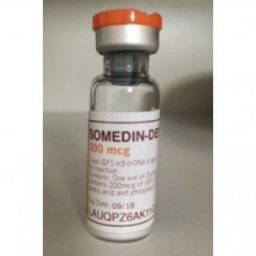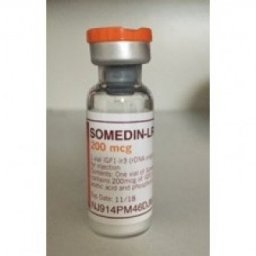IGF-1: Uses, Side Effects and Common Brands
Insulin like growth factor (IGF-1) is indicated for the long-term treatment of growth failure in children with severe primary insulin growth factor deficiency (IGF-1). The insulin like growth factors consists of proteins with high sequence to insulin. It acts as a neurotrophic factor, inducing the survival of neurons. It blocks the muscle atrophy and protects the cartilage cells. It is a medicine that may be obtained only with prescription, considering the growth factor deficiency and particular medical condition of the patient. Prior to commencing the therapy with insulin growth factor, family and caregivers should read carefully the indications of administration and other important information related to the therapy with this medicine in order to avoid aggravation of existing condition and other side effects.
Contraindications
It is contraindicated in patients with apparent hypersensitivity to the medicine or to any of its components. It should also be avoided if there is clinical evidence of allergic reaction to mecasermin. Monitor the signs and symptoms of hypersensitive reaction to insulin growth factor in order to avoid developing of more severe adverse effects.
Insulin like growth factor is contraindicated in patients with malnutrition, hypothyroidism and chronic treatment with pharmacologic doses of anti-inflammatory steroids.
Insulin like growth factor should be avoided if the child has cancer.
This medicine is contraindicated for use in newborns.
Warnings and precautions with insulin like growth factor
As already mentioned above, it is important to consult a doctor before starting to use insulin like growth factor. Take all protective measures in order to avoid developing of insulin-like hypoglycemic effect. Monitor the therapy with this medicine in patients less than 2 years of age in order to exclude developing of intracranial hypertension and other side effects.
Patients should stay under the supervision of physicians for the whole length of treatment with this medicine in order to avoid slipped capital femoral epiphysis and scoliosis and local or systemic allergic reactions that may occur during therapy with insulin growth factor.
Prior to commencing the therapy with this medicine, it is important to present to a physician the medical history of child, especially if there is clinical evidence of diabetes mellitus, kidney disease, liver disease, scoliosis and allergies. It is important to evaluate from the very beginning the potential risks from the therapy with insulin growth factor.
There have been reported allergic reactions to insulin like growth factor. The reported symptoms included anaphylaxis that required immediate hospitalization. It is important to monitor all symptoms of hypersensitive reaction to the medicine, in order to avoid hospitalization and aggravation of existing symptoms.
It is not recommended to interrupt the therapy with insulin like growth factor. It is important because after sudden discontinuation with this medicine, patients may develop system allergy to it.
Insulin like growth factor should not be used instead of growth hormone. It should not be used while pregnant or breastfeeding. Prevent your doctor about all medicines your child is taking on a daily basis, including prescription, non-prescription ones, vitamins, minerals, natural supplements or herbal products. Some products may require dose adjustment in order to avoid potential interaction with insulin growth factor.
Indications of administration and dosage
Insulin like growth factor should be administered by subcutaneous injection. It is recommended a close monitoring until it is established a well-tolerated dose. Generally, the doses are set individually considering the medical condition of the patient. The usual recommended dose of insulin like growth factor is 0.04 to 0.08 mg per kg twice daily by subcutaneous injection. The dose might be increased by 0.04 mg per kg per dose until it reaches a maximum of 0.12 mg per kg given twice daily. It is important to receive the injection right before or right after a meal or snack in order to avoid hypoglycemic effects of insulin. Therefore, if the patient did not take the meal, insulin should not be given.
Indications of administrations:
- In order to avoid lipohypertrophy, it is necessary to rotate the injection to a different site (buttock, upper arm, abdomen or thigh);
- The medicine should be administered using sterile disposable syringes and needles;
- The medicine needs to be inspected visually prior to the administration for particulate matter and discoloration;
- The child should be carefully monitored during the administration of injection in order to keep him calm and relaxed.
Possible side effects of insulin like growth factor
Like most of medicines, insulin growth factor may cause side effects even if used in prescribed doses. Generally, this happens because all patients react in a different way to the medicines. There have been reported side effects with insulin like growth factor such as:
- Low blood sugar or so called hypoglycemia. In order to reduce the incidence, it is recommended to give the child insulin right before or right after a meal or snack. The signs of hypoglycemia include the following: tiredness, hunger, sweating, nausea, dizziness, difficulty in concentrating, irritability, restlessness, fast or irregular heartbeat. Closely monitor the child in order to assess his tolerance to the drug and if any from the enumerated side effects occur, report about them right away. If the child is sick and cannot eat, do not give him the medicine.
- Intracranial hypertension (increased pressure in the brain), insulin like growth factor may cause temporary increase in pressure within the brain. The symptoms of such adverse event are blurred vision, nausea and vomiting, persistent headache.
- Allergic reactions to the medicine. If there are signs of allergic reaction to the medicine, such as hives, rash that appear as itchy skin reaction contact a doctor right away.
- Other symptoms of allergic reaction to the product are the following: dizziness, clammy skin, difficulty in breathing that goes into shock.
- Worsened scoliosis that may be caused by rapid growth.
- Slipped capital femoral epiphysis. If the child develops a limp or has knee pain, seek prompt medical care and assistance.
- Enlarged tonsils. The signs include the following: difficulty breathing or swallowing, fluid in the middle ear, snoring and sleep apnea.
If any of the enumerated conditions occur, seek immediate medical care and assistance. Post-Marketing experience with insulin like growth factor may include such adverse events as: anaphylaxis, generalized urticaria, systemic hypersensitivity, dyspnea and angioedema. If after finishing the therapy with insulin like growth factor your child develops any of the enumerated side effects, contact a doctor right away and get prompt treatment.



